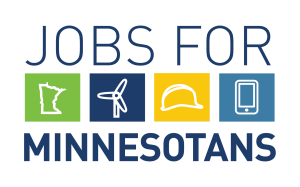St. Paul, Minnesota (Jan. 9, 2017) – Jobs for Minnesotans today released the following statement in response to the federal Final Record of Decision approving the land exchange for PolyMet Mining’s NorthMet project:
“Jobs for Minnesotans celebrates this important milestone for copper-nickel mining in Minnesota. The federal Final Record of Decision for PolyMet’s land exchange validates the project’s comprehensive environmental review process culminating in the Final Environmental Impact Statement. Furthermore, this decision acknowledges that this land exchange is in the best interest of the public.
The NorthMet project has been thoroughly examined by multiple state and federal agencies, and this decision takes us one step closer to bringing hundreds of jobs to an area of the state that desperately needs the economic opportunities that this project will provide. Following this momentous decision, we are confident that PolyMet will work efficiently with the agencies to complete the permitting process in a timely fashion.”
About Jobs for Minnesotans
Jobs for Minnesotans, a coalition representing business, labor and communities, supports statewide opportunities for prosperity and middle-class jobs from sustainable natural resource development in Minnesota. The organization is committed to the principle that our state can preserve both job opportunities and the environment for future generations. Jobs for Minnesotans was co-founded in 2012 by the Minnesota Building and Construction Trades Council representing 55,000 workers and the Minnesota Chamber of Commerce representing 2,300 companies and 500,000 employees. For more information, visit jobsforminnesotans.org, follow @JobsforMN on Twitter and find the coalition on Facebook.com/Jobs4MN.
###
Media Contact: Nancy Norr, Board Chair
nnorr@mnpower.com
Office: 218.723.3905
Cell: 218.590.6978
People from Ely Also Back Mining
Mesabi Daily News
Larry Musich
In a Nov. 27 article in the Star Tribune (“Loved and loathed, she’s drawn line in BWCA”), anti-mining activist Becky Rom claimed that when she meets with members of Congress and officials at the Department of Agriculture, Bureau of Land Management, or Department of the Interior, she and her fellow advocates “always say, ‘Hi, we’re from Ely.’ ”
Well, Ms. Rom: Hi, I’m from Ely, too! Ely was founded as a mining town. The Lake Vermilion gold rush brought many pioneers to the area in 1865. Although hardly any gold was found, it was discovered that the area did contain large deposits of iron ore. Thousands of new immigrants came to America at this time. Soon they came to the Minnesota Iron Range looking for work. When the Duluth, Mesabi and Iron Range Railway extended its rails from Tower to Ely in 1888, Ely began mining operations with the opening of the Chandler Mine. Ore was shipped to docks on Lake Superior in Two Harbors and Duluth.
Duluth News Tribune
David Ross (President of the Duluth Area Chamber of Commerce)
In their defense, we believe they have noble intentions. They are kind, sensitive and caring individuals. Their campaign literature states that they “want to represent all Duluthians, no matter our age, race, gender, class, occupation and political affiliation.” Duluth City Councilors Em Westerlund and Gary Anderson are, and do, all of these things. Unfortunately, if unchallenged and unchecked, they may soon become one more thing — job killers.
A few months ago, they led the charge to have the Duluth City Council add a discretionary, imprudent roadblock to PolyMet Mining’s rightfully onerous and demanding mining application and approval process. Fortunately, more balanced members of the Duluth City Council voted down their misguided initiative.
Counterpoint: Mining Opponents Ignore Facts, History and People
Star Tribune
Larry Musich
Ely was founded as a mining town. The Lake Vermilion gold rush brought many pioneers to the area in 1865. Although hardly any gold was found, it was discovered that the area did contain large deposits of iron ore. Thousands of new immigrants came to America at this time. Soon they came to the Minnesota Iron Range looking for work.
Those opposed to mining have no interest in these historical facts. But it was the miners and their families who made Ely thrive, which allowed businesses to develop like Ace Hardware, barbershops, drug stores, Penney’s, Wards, Sears, etc. — and even Canoe Country Outfitters!
Read More: http://www.startribune.com/counterpoint-mining-opponents-ignore-facts-history-and-people/408862225/
Duluth News Tribune
John Swanson (Vice President of Major Projects Execution for Enbridge)
A Dec. 11 commentary in the News Tribune by Winona LaDuke (Native View: “Enbridge must be held accountable in northern Minnesota”) contained several misstatements and inaccuracies about Enbridge that deserve clarification.
Enbridge’s Line 3 Replacement Project provides a vital link between North American production regions and Minnesota, Wisconsin and other North American refinery markets. Enbridge proposes replacing Line 3 to maintain high safety standards and to reduce future maintenance activities that result in disruptions to landowners and the environment. The line undergoes systematic preventative maintenance activities and inspections to ensure safe operation, and these activities will continue until the new line is put into service. To suggest we need to “clean up” the “old” Line 3 is patently false.
